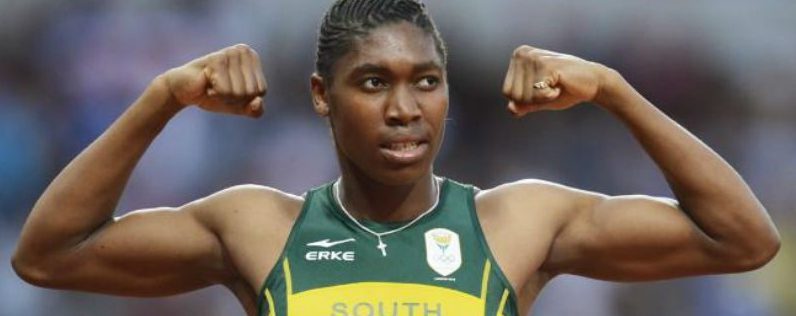Controversy ignites over South African middle-distance runner Caster Semenya and her right to run as a woman.
On Saturday night in Rio, South African runner Caster Semenya won the Olympic Gold Medal for the women’s 800 metres amidst ongoing controversy about her naturally high testosterone levels.
The controversy began hours before the 800 metres final at the 2009 World Athletic Championships, when the International Association of Athletics Federations (IAAF) revealed that they’d asked Caster to undergo gender testing to investigate whether she met the criteria to compete as a female athlete.
Eighteen year old Caster won the gold medal but instead of being celebrated for her athletic ability, she was publicly shamed and humiliated over science too complex for most of us to understand.
Caster told the BBC last year, “I was world champion but I was never able to celebrate it. It was a joke for me.” The IAAF cleared Caster to return to competition in July 2010 but did not release the results of her gender verification tests. In 2011, the IAAF introduced a new policy restricting the levels of testosterone female athletes were permitted to have and forcing female athletes to comply with the new eligibility determination process.
In the press conference following her win on Saturday night, Caster refused to discuss whether the IAAF had ever forced her to reduce her testosterone levels or the controversy surrounding her.
“It’s all about loving one another. It’s not about discriminating against people. It’s not about looking at people [and] how they look, how they speak, how they run. You know, it’s not about being muscular. It’s about sports. When you walk out of your apartment, you think about performing. You don’t think about how your opponents look. You just want to do better. I think the advice to everybody is to go out and have fun.”
The IAAF’s treatment of Caster and other female athletes with hyperandrogenism has raised serious questions about the protection of the human rights and dignity of female athletes and allegations of racism and sexism. The validity of gender testing methods and the science behind the setting of arbitrary testosterone limits are being questioned by scientific experts and the courts, while the psychological impact on the athletes themselves is yet to be measured.
In 2007, Indian runner Santhi Soundarajan attempted suicide after being stripped of her silver medal at the Asian Games after failing a gender test. Last year the BBC reported that a 2013 report states that four athletes from “developing countries” with hyperandrogenism, which causes high levels of testosterone in women, were sent to France for hormone treatment and genital surgery. The BBC also reported that Indian sprinter Dutee Chand refused similar treatment allegedly offered to her.
Chand’s case was taken to the Court of Arbitration For Sports (CAS), who In July last year overturned the IAAF’s policy on limiting testosterone levels in women and gave them until 2017 to prove what kind of advantage, if any, hyperandrogenism gave female athletes over their competitors. The IAAF is looking to have this decision overturned.
In her BBC interview last year, Caster described the media assault surrounding her 2009 win. “It was upsetting, you feel humiliated. You cannot control what people think. It is about yourself, controlling yourself – what is in you. But now I want to focus more on the future, I don’t want to go back there. What is done is done.”
Caster has the support of her beloved South Africa behind her and the love and acceptance of her family.
And then there’s her wife, Violet Raseboya, who Caster met at the age of 15 and married in a traditional ceremony last year.
In an April interview with South Africa’s Sunday Times, Caster said of Violet, “She means everything to me. She means the world and she’s the best thing that ever happened to me, because she supports me in everything I do. She’s the one who encouraged me to go to school, to train hard, to look up to my future.”
While athletes, scientists, lawyers and sports officials fight about the ethical, moral and scientific implications of attempting to create a level playing field for women, it is real women who are trapped at the centre of this debate.
As Caster told the BBC last year, “I am not a fake. I am natural. I am just being Caster…I don’t want to be someone people want me to be. I just want to be me.”
